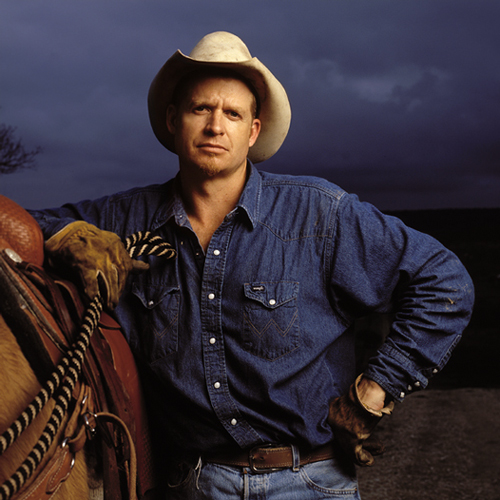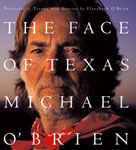 |
|
Selected photos from Michael O'Brien's The Face of Texas.
|
||||
|
||||
|
Charlie Robison - Charlie Robison's mother, Martha Ben, tended bar at various watering holes around his hometown of Bandera: she managed the Purple Cow Saloon; and at the Mayan Dude Ranch, she poured drinks and played a "Pistol-Packin' Mama" in the bar's Wild West show. Robison was accustomed to honky-tonks and juke joints at an early age, and music was in his blood. "It was in the early 70s, at the height of the outlaw movement when Willie had returned [from Nashville]," says Robison of the "cross-pollination" of rednecks and hippies that characterized the music scene then. "When I wasn't working on the ranch with my grandfather and father, I was sitting behind the bar listening to music at a grungy Texas honky-tonk." Robison, originally a drummer by default, was only fifteen when he took to the stage himself. He first played in a band with his brother Bruce on bass, and a friend on guitar. He got what was left - drums. The trio cut their musical teeth playing rodeos and school dances in their quaint Hill Country hometown, population 940, which was settled by Polish immigrants in the nineteenth century. Later, Robison switched to guitar and singing and became so focused on music that college got in the way. He dropped out of Southwest Texas State, sacrificing football and baseball scholarships, and headed to Austin. He spent a few years establishing his music career in bands like the Chaparrals, Two Hoots and a Holler, and the Millionaire Playboys - until the 90s, when he went solo and eventually returned to Bandera and the land that inspires him. "I always felt I was born a century too late," says Robison, who raises cattle and quarter horses on his family spread and lives in a 1920s-era ranch house with his wife, Emily, the banjo player for the Dixie Chicks. "Texas is the only place you can lie to yourself that time has stood stillwhere you can play cowboys and Indians the rest of your life." Robison's songs gritty, robust reflect the man himself, a native Texan whose family has ranched in Bandera for six generations. Family, Texas history and real life are the stuff of his music, and in Robison's case, you can go home again: If you're ever out west son, and you're feelin' like slowin' down ("My Hometown," Life of the Party CD) |
||||
|
Write a Letter to the Editor
Join our Mailing List
© The Digital Journalist
|




